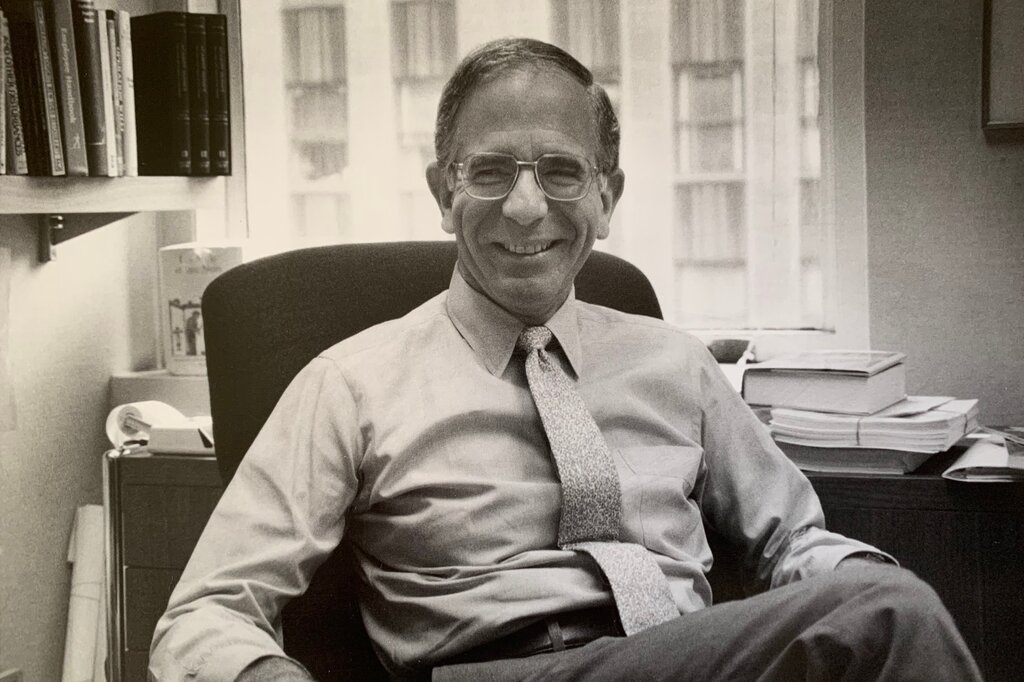Jim was beloved by many. The New York Times obituary reminds us of his stellar career:
James Silberman, a revered book editor whose meticulousness, intuition and patience helped propel the publishing careers of a distinguished roster of authors, including James Baldwin, Marilyn French, Hunter S. Thompson and Alvin Toffler, died on July 26 at his home in Manhattan. He was 93
In his office the photo brings him to life. How many times I walked into that office, how many authors did, to find this assured editor, at home in his own skin, a listener, astute, ready to find a solution to whatever problem existed. He was gentle but firm, a true lover of books. He figures strongly in the plot of The Hell’s Angels Letters: Hunter S. Thompson, Margaret Harrell and the Making of an American Legend. After all, he was his Hunter’s book editor, which is how I come in, as Jim’s copy editor (also assistant editor) on that book, Hell’s Angels. As with James Baldwin and others, Jim just plucked them out of the obscurity or a difficult position and righted their careers. Decades later, for the Letters book, I interviewed Jim four times. Below is a miniscule excerpt of one of those interviews that you can find in the Letters:
As the telephone interview with Jim begins (in 2011), I tell him I’m going to talk into the tape recorder. I open by asking how he got involved with Hell’s Angels.
JS: [Bernard] Shir-Cliff read the piece in the Nation and sent it to me.
MAH [repeating into the tape recorder]: So, you’re saying Shir-Cliff read the piece in the Nation and sent it to you.
JS: Yes.
MAH: OK. And then you went out to San Francisco, I guess.
JS: Ballantine and Random House made a deal with Hunter.
MAH: Yeah, and I guess after that—
JS: I went out to San Francisco to collect a manuscript from him.
Ed’s Note: In June 1966
MAH: [laughs] That was still a hard thing.
JS: He wasn’t sending it. I went out there to get it away from him.
MAH: Yeah. And I guess you had some luck.
JS: [explains about Hunter being under contract] He was having trouble—not writing, but he was having trouble pulling the book together.
MAH: Right.
MAH: OK. So you went out there. But you were a wonderful influence. I’m sure that you would give a steady hand to him; I’m sure he would feel that. And pressure too.
JS: He must have all those years ’cause we were together a long time.
MAH: I’m going to repeat that: “He must have all those years’ cause we were together a long time.” You surely were. I mean, all the time you were with him he was productive.
JS: Yep.
We cover many topics. But that is a snippet. What stands out about it is that the official line in Hunter’s biography omits the fact that Jim went out there and builds an incredible tale around the fact that he did not. To read about Jim in the New York Times obituary, click here. It’s well worth a read: a true giant, very very intelligent, meticulous, gentle sharp on the money, my friend, my boss for a while. Central to my New York City years. His wife Selma Shapiro Silberman was also part of the Random House scene back then. And she survives him after decades of a happy marriage in which, near the end, he said, “We laugh a lot.”
I am so pleased that the day before Jim died, I emailed (which I rarely did) with an announcement of the book publication and a photo of the cover. I think it would mean something to him, as he always rooted for me. Suppose I hadn’t phoned two weeks before. Suppose I hadn’t sent the email. But I did:
Hi, Jim and Selma,
This is the book. A complimentary copy is in the mail to you and should arrive next week.
Would you let me know you received it. I hope you like it. The interviews in the back are a very important part of the story, and Jim was vital there to adding context. I so appreciated that. I enjoyed talking with you and hope Jim is faring better. Warmly, Margaret
